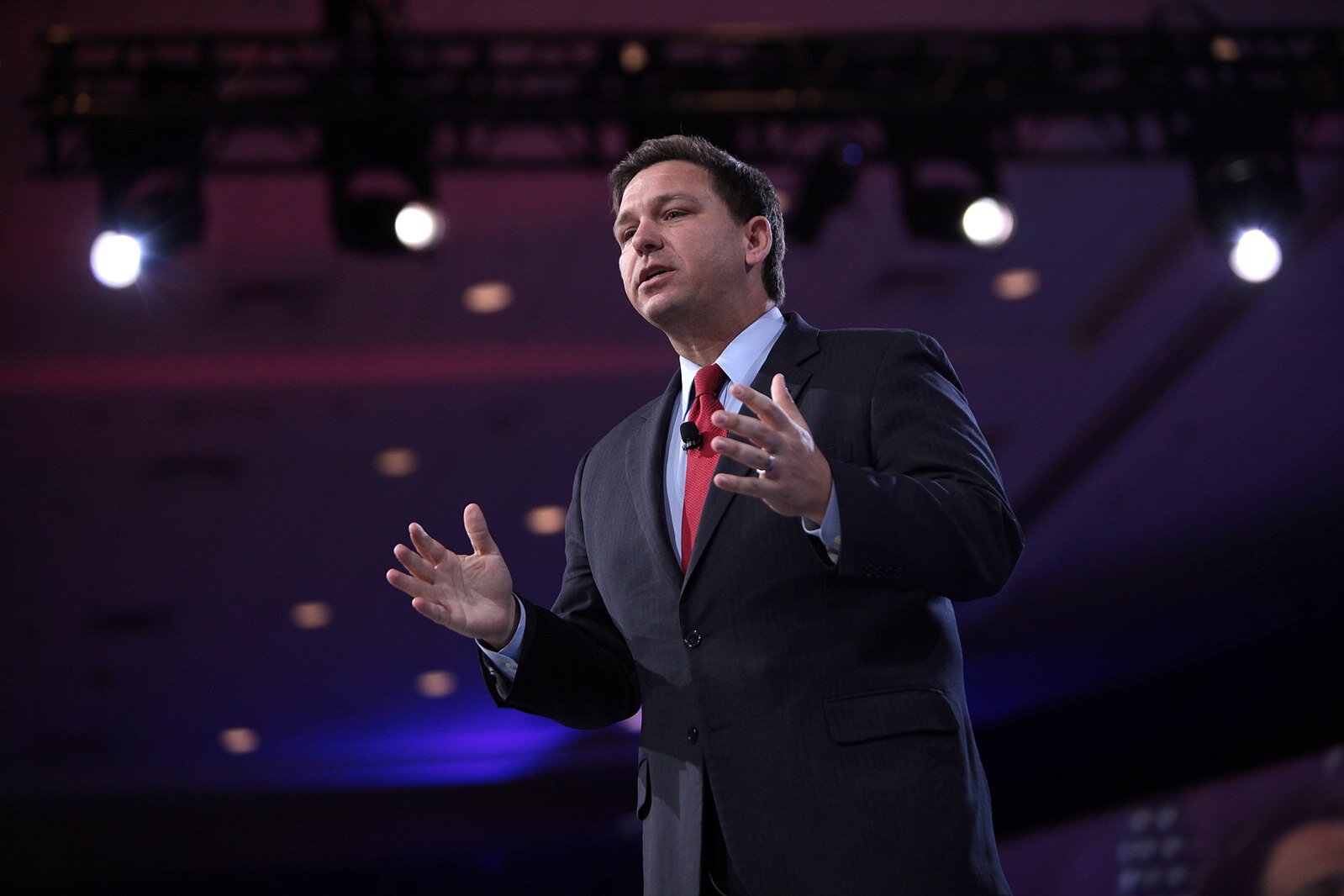
It has been a notable year for Florida Governor Ron DeSantis. He gained widespread attention for his reluctance to impose COVID restrictions on his state’s residents, making him very popular with conservatives in his state and around the country. In June, he won a straw poll for the 2024 presidential election taken at the Western Conservative Summit in Denver, receiving the highest approval out of all the potential candidates in a 31-person field, including former President Trump.
However, if DeSantis decides to mount an effective presidential campaign in 2024, he will need to win over the “Trump-to-Biden” voters who we regularly talk to in our monthly Swing Voter Project. Our most recent research on August 10th with these voters from the ten most competitive 2020 states revealed a red flag for DeSantis’s political aspirations as our country confronts the emergence of the Delta variant.
On July 30, DeSantis issued an executive order that aims to “protect the freedoms and statutory rights of students and parents by renting with the parents the decision whether their children should wear a mask in school.” The order empowers the Florida Commissioners of Education to “pursue all legal means available to ensure school districts adhere to Florida law, including but not limited to withholding state funds from non-compliant school boards,” including those who impose mask mandates for students in their school district.
Our August “Trump-to-Biden” voters – six Democrats, three Republicans, and four independents – are paying attention to DeSantis and how he confronts mask-wearing. The red flag for DeSantis and governors around the country imposing similar executive actions against mask mandates in schools is that most of these voters – 11 of 13 – believe a local school board should decide if it wants to require students to wear masks at school, not the governor.
“If a school board wants to decide on their own that they want to enforce the [mask mandate] policy, the governor should not be able to overrule that necessarily because of some stupid political beliefs,” said Brian, 47, from St. Clair County, MI. “But if you’re mandating to put masks on in the interest of public health, that’s a different story altogether. Those are two completely separate ways that I would react to that. If the situation was reversed and the governor said mask mandates are required across the entire state and the school board got together and said, ‘No, we’re not going to follow what the governor said,’ those are two different scenarios. One is in the interest of public health and the other one is playing politics.”
Notably, most swing voters are opposed to a governor undoing a mask mandate, but a slight majority – 7 of 13 – would favor a governor imposing a mask mandate over the will of a local school board due to concerns about public health.
The emergence of the Delta variant has become a focal point in our country, but it hasn’t shifted their view about who should be making decisions about education: they believe the more decisions are localized, the better. While only three are concerned the Delta variant might cause schools in their area to not re-open for in-person learning this autumn, almost all – 12 of 13 – do not see a role for the federal government to ensure they do, indicating the decision should be left solely to states and localities.
Our most recent research revealed these “Trump-to-Biden” voters are very concerned about the Delta variant, and perhaps that’s tied to our discovery that they vastly overestimate the threat Covid poses to fully vaccinated Americans – both in terms of rates of death and hospitalization.
We found that one respondent believes the percentage of fully vaccinated Americans who have been hospitalized with COVID is between 2%-5%; seven think it’s between 1%-2%; three say it’s below 1%; one believes it’s infinitesimally well below 1%; one offered no opinion. In fact, CNN reported that as of August 2, 164 million Americans had been fully vaccinated. Of those, just 7,101 had been hospitalized with Covid. That’s less than 0.005% – a minuscule number.
Among the universe of fully vaccinated Americans, nine respondents believe the percentage of those who have died with COVID is below 1%, and four think it’s infinitesimally well below 1%. That same CNN analysis found that the percentage of fully vaccinated Americans who died from Covid stood at 0.001% as of August 2.
Their over-inflation of the perceived risk posed by the Delta variant for hospitalization and death, which is much higher than the reality, could ultimately impact public policy.
This week, for example, New York City will become one of the first cities in the U.S. to require proof of vaccination from the employees and patrons of restaurants, gyms, and indoor venues, such as movie theaters and concert halls. These “Trump-to-Biden” voters are split over whether they would support this kind of proof-of-vaccination in their own city or town, with six supporting the idea and seven opposed. But it’s easy to understand why those who think they’re at high risk of hospitalization would support government steps to protect them.
Jo Anne, 57, from Collin County, TX remarked: “I think that if we can prove that we’re vaccinated, it helps stop the spread of [Covid]. It helps stop the mutations [resulting in] different variants of it. I have no problem showing that I’m vaccinated.”
For those opposed to this proposal, their concerns were generally focused on how it would be implemented, and the validity of the vaccination cards that employees and patrons would present at those businesses, and less about it infringing on their rights.
“I just think that from what I’ve seen, there are so many ways to counterfeit vaccination cards,” said Than, 49, of Collin, TX. “I know it’s a good idea, but I just think that implementing it is just going to be hard, and validating it.”
Tami, 61, from Washington County, MN commented: “Parts of me see the benefit of it, but you’re seeing fraudulent vaccine cards. I just don’t know how accurate it would be.”
In short, a top-down government approach for addressing issues related to COVID isn’t appealing to “Trump-to-Biden” voters. Our elected leaders’ ability to adjust to that reality will shape the political landscape as we move toward 2022 and beyond.

Rich Thau
Rich is the President of Engagious. His company is the industry leader in scientifically testing and refining the effectiveness of business and issue-advocacy content, moment-to-moment. The firm helps its clients become more successful by applying the power of behavioral science and social psychology to dial test focus groups.

Matt Steffee
Matt is the Vice President of Research at Engagious, responsible for conducting qualitative research, writing dial test scripts, gathering data, conducting analyses, writing reports, creating presentations, and moderating in-depth interviews.






